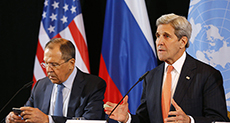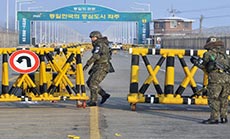Twenty Six Years on 1982 Invasion, Resistance Made the Change

Source: Al-Manar, 06-06-2008
June 6 is a day with a special characteristic. It's a day that marked the beginning of a new era in the Arab-'Israeli' conflict and paved the way for strong resistance movements to rise and eventually make a change.
On this day, twenty-six years ago, 'Israeli' occupation forces launched a massive military incursion into Lebanon in an operation dubbed "Peace for Galilee." At first glance, the 'Israeli' aggression seemed to be aimed at south Lebanon, but then Defense Minister Ariel Sharon pushed all the way to the capital Beirut.
"Peace for Galilee" for the 'Israelis' is the "'Israeli' Invasion" for the Lebanese. It began on 6 June, less than two months after 'Israel' transformed its defeat in Sinai into a political victory in Camp David. Then 'Israeli' Prime Minister Menachem Begin got the impression that all Arab countries would follow Egypt and sign so-called peace deals with 'Israel'.
Jordan gave its word to 'Israel' that it would sign such treaty once Lebanon signs a similar one. The Kingdom did not want to get involved in any agreement that would put it at odds with the Palestinian Liberation Organization (PLO) that had its leadership headquarters in Beirut.
Back then, Lebanon meant the fertile land for Palestinian resistance movements; thus dealing a blow to the PLO in Lebanon would crush the resistance once and for all and pave the way for signing a peace deal with Lebanon and then with Arab states. In doing this, 'Israel' would extract the acknowledgment of Arabs in the so-called "state of 'Israel'" and open the way for political and economic expansion in the Middle East region.
Menachem Begin found that the only way to achieve this "glory" for 'Israel' was to invade Lebanon to crush the PLO, but under what pretext?
On July 24, 1981, US President Ronald Reagan's special envoy Philip Habib arrived in Beirut with a controversial mission. Habib managed to broker a shaky nine-months ceasefire between Yasser Arafat and 'Israel'. When the ceasefire took effect, Tel Aviv was like a beehive preparing politically and logistically for their "big time invasion."
Back in Beirut, 'Israeli' and pro-'Israeli' bodies worked persistently on straining the internal front. Clashes between Lebanese and Palestinian forces expanded throughout south Lebanon. Both forces got weak and their chances of closing ranks to confront any 'Israeli' military operation were zero.
The element of direct military resistance was removed at a time some Arab regimes were at the Arab Summit in Fass preparing a formula to penetrate the Arab impregnability.
So everything was ready for the invasion. 'Israel' just needed the pretext and it was not hard to find. On June 3, 1982, 'Israel's' ambassador in London Shlomo Argov escaped an assassination attempt.
The 'Israeli' intelligence told Begin that the PLO was not involved in the attack, however he withheld this information from his cabinet. Rafael Eitan, who was then the Chief of Staff of the 'Israeli' army, responded to the aforementioned information in his famous saying "Abu Nidal, abu shmidal. We need to end PLO!"
'Israel' got its golden opportunity. Hours after the assassination attempt, 'Israeli' F-16 jets bombed Palestinian refugee camps and other PLO targets in Beirut and southern Lebanon killing 45 and wounding 150. For the first time in over ten months, the PLO responded by launching artillery and mortar rounds on northern occupied Palestine. On June 6, 1982, Sharon directed his forces into Lebanon.
According to former chief of 'Israeli' military intelligence Yehoshafat Harkabi, the 1982 invasion of Lebanon was accompanied by deceit at the highest political levels. Harkarbi cites misleading statements to the cabinet by Ariel Sharon and Begin, inaccurate announcements by 'Israel's' military spokesmen and the Likud government's gross exaggeration of attacks conducted from Lebanon.
'Israel's' publicly stated objective was to push PLO forces back 40 kilometers to the north. The mission was accomplished, but 'Israel' is now determined to drive the PLO out of the south. The southern cities of Tyre and Sidon were severely hit and damaged.
Sharon had his eyes set on Beirut. He shelled it for ten long summer weeks.
An agreement was reached later in 1982, and American, French, and Italian peacekeepers, known as the Multinational Force in Lebanon, sent more than 14,000 PLO combatants out of the country in August and September. About 6,500 Fatah fighters sailed from Beirut to Jordan, Syria, Iraq, Sudan, both North and South Yemen, Greece, and Tunisia - the latter of which became the new PLO headquarters. Philip Habib assured the PLO that the Palestinian civilians in the refugee camps would not be harmed.
One day after the assassination of the newly appointed president of Lebanon Bashir Gemayel (the leader of the Phalanges' Lebanese Forces), 'Israeli' forces occupied West Beirut, in violation of the Habib agreement. At that time the Lebanese Christian Militia, also known as the Phalange Party, was allied with 'Israel'. The 'Israeli' command authorized a force of about 150 Phalange fighters' entrance into the Sabra and Shatila refugee camps, under the leadership of Lebanese Forces senior official Elie Hobeika. The result was a massacre of between 700 and 3500 defenseless Palestinians. 'Israeli' further investigation found that Ariel Sharon is indirectly responsible of this massacre, leading to his resignation from his position as defense minister.
The United States Marines left West Beirut two weeks before the end of their official mandate following the 1983 Beirut bombing.
In September 1982, the PLO withdrew most of its forces from Lebanon. 'Israeli' forces retreated to south Lebanon and formed the notorious security zone, although UN Security Council resolution 425 that calls upon 'Israel' immediately to cease its military action against Lebanese territorial integrity and withdraw forthwith its forces from all Lebanese territory.
It was the beginning of a new era; the era of resistance. A group of young Lebanese gathered themselves with small arms and launched attacks against 'Israeli' posts in occupied areas. At that time, they were just amateurs, but very tough amateurs. Ahmad Kassir opened the era of martyrdom operation shortly after the occupation. He blew up the headquarters of the 'Israeli' military ruler in the southern city of Tyre. 'Israel' began to realize the swamp it put itself in as a new Islamic resistance was on the rise, it was to be called Hizbullah (The Party of God). What the international community failed to achieve through resolution 425, Hizbullah realized with the power of faith, arms, steadfastness, honesty and determination. In 2000, 'Israel' was forced to withdraw its troops from southern Lebanon. Six years later, Hizbullah defeated 'Israel' in its Second Lebanon War. Today, as Hizbullah became stronger than ever, its secretary general Sayyed Hasan Nasrallah renewed his promise that "the era of defeats is long gone and the time of victories has begun," stressing that the 2006 defeat marks the beginning of 'Israel's' ultimate fall.
June 6 is a day with a special characteristic. It's a day that marked the beginning of a new era in the Arab-'Israeli' conflict and paved the way for strong resistance movements to rise and eventually make a change.
On this day, twenty-six years ago, 'Israeli' occupation forces launched a massive military incursion into Lebanon in an operation dubbed "Peace for Galilee." At first glance, the 'Israeli' aggression seemed to be aimed at south Lebanon, but then Defense Minister Ariel Sharon pushed all the way to the capital Beirut.
"Peace for Galilee" for the 'Israelis' is the "'Israeli' Invasion" for the Lebanese. It began on 6 June, less than two months after 'Israel' transformed its defeat in Sinai into a political victory in Camp David. Then 'Israeli' Prime Minister Menachem Begin got the impression that all Arab countries would follow Egypt and sign so-called peace deals with 'Israel'.
Jordan gave its word to 'Israel' that it would sign such treaty once Lebanon signs a similar one. The Kingdom did not want to get involved in any agreement that would put it at odds with the Palestinian Liberation Organization (PLO) that had its leadership headquarters in Beirut.
Back then, Lebanon meant the fertile land for Palestinian resistance movements; thus dealing a blow to the PLO in Lebanon would crush the resistance once and for all and pave the way for signing a peace deal with Lebanon and then with Arab states. In doing this, 'Israel' would extract the acknowledgment of Arabs in the so-called "state of 'Israel'" and open the way for political and economic expansion in the Middle East region.
Menachem Begin found that the only way to achieve this "glory" for 'Israel' was to invade Lebanon to crush the PLO, but under what pretext?
On July 24, 1981, US President Ronald Reagan's special envoy Philip Habib arrived in Beirut with a controversial mission. Habib managed to broker a shaky nine-months ceasefire between Yasser Arafat and 'Israel'. When the ceasefire took effect, Tel Aviv was like a beehive preparing politically and logistically for their "big time invasion."
Back in Beirut, 'Israeli' and pro-'Israeli' bodies worked persistently on straining the internal front. Clashes between Lebanese and Palestinian forces expanded throughout south Lebanon. Both forces got weak and their chances of closing ranks to confront any 'Israeli' military operation were zero.
The element of direct military resistance was removed at a time some Arab regimes were at the Arab Summit in Fass preparing a formula to penetrate the Arab impregnability.
So everything was ready for the invasion. 'Israel' just needed the pretext and it was not hard to find. On June 3, 1982, 'Israel's' ambassador in London Shlomo Argov escaped an assassination attempt.
The 'Israeli' intelligence told Begin that the PLO was not involved in the attack, however he withheld this information from his cabinet. Rafael Eitan, who was then the Chief of Staff of the 'Israeli' army, responded to the aforementioned information in his famous saying "Abu Nidal, abu shmidal. We need to end PLO!"
'Israel' got its golden opportunity. Hours after the assassination attempt, 'Israeli' F-16 jets bombed Palestinian refugee camps and other PLO targets in Beirut and southern Lebanon killing 45 and wounding 150. For the first time in over ten months, the PLO responded by launching artillery and mortar rounds on northern occupied Palestine. On June 6, 1982, Sharon directed his forces into Lebanon.
According to former chief of 'Israeli' military intelligence Yehoshafat Harkabi, the 1982 invasion of Lebanon was accompanied by deceit at the highest political levels. Harkarbi cites misleading statements to the cabinet by Ariel Sharon and Begin, inaccurate announcements by 'Israel's' military spokesmen and the Likud government's gross exaggeration of attacks conducted from Lebanon.
'Israel's' publicly stated objective was to push PLO forces back 40 kilometers to the north. The mission was accomplished, but 'Israel' is now determined to drive the PLO out of the south. The southern cities of Tyre and Sidon were severely hit and damaged.
Sharon had his eyes set on Beirut. He shelled it for ten long summer weeks.
An agreement was reached later in 1982, and American, French, and Italian peacekeepers, known as the Multinational Force in Lebanon, sent more than 14,000 PLO combatants out of the country in August and September. About 6,500 Fatah fighters sailed from Beirut to Jordan, Syria, Iraq, Sudan, both North and South Yemen, Greece, and Tunisia - the latter of which became the new PLO headquarters. Philip Habib assured the PLO that the Palestinian civilians in the refugee camps would not be harmed.
One day after the assassination of the newly appointed president of Lebanon Bashir Gemayel (the leader of the Phalanges' Lebanese Forces), 'Israeli' forces occupied West Beirut, in violation of the Habib agreement. At that time the Lebanese Christian Militia, also known as the Phalange Party, was allied with 'Israel'. The 'Israeli' command authorized a force of about 150 Phalange fighters' entrance into the Sabra and Shatila refugee camps, under the leadership of Lebanese Forces senior official Elie Hobeika. The result was a massacre of between 700 and 3500 defenseless Palestinians. 'Israeli' further investigation found that Ariel Sharon is indirectly responsible of this massacre, leading to his resignation from his position as defense minister.
The United States Marines left West Beirut two weeks before the end of their official mandate following the 1983 Beirut bombing.
In September 1982, the PLO withdrew most of its forces from Lebanon. 'Israeli' forces retreated to south Lebanon and formed the notorious security zone, although UN Security Council resolution 425 that calls upon 'Israel' immediately to cease its military action against Lebanese territorial integrity and withdraw forthwith its forces from all Lebanese territory.
It was the beginning of a new era; the era of resistance. A group of young Lebanese gathered themselves with small arms and launched attacks against 'Israeli' posts in occupied areas. At that time, they were just amateurs, but very tough amateurs. Ahmad Kassir opened the era of martyrdom operation shortly after the occupation. He blew up the headquarters of the 'Israeli' military ruler in the southern city of Tyre. 'Israel' began to realize the swamp it put itself in as a new Islamic resistance was on the rise, it was to be called Hizbullah (The Party of God). What the international community failed to achieve through resolution 425, Hizbullah realized with the power of faith, arms, steadfastness, honesty and determination. In 2000, 'Israel' was forced to withdraw its troops from southern Lebanon. Six years later, Hizbullah defeated 'Israel' in its Second Lebanon War. Today, as Hizbullah became stronger than ever, its secretary general Sayyed Hasan Nasrallah renewed his promise that "the era of defeats is long gone and the time of victories has begun," stressing that the 2006 defeat marks the beginning of 'Israel's' ultimate fall.
Comments

Kerry to Hold Fresh Talks with Russia on Syria
8 years ago
All but 4 Nations are Subject to NSA’s Espionage
10 years ago
Koreas Agree to Re-open Kaesong Industrial Zone
11 years ago
